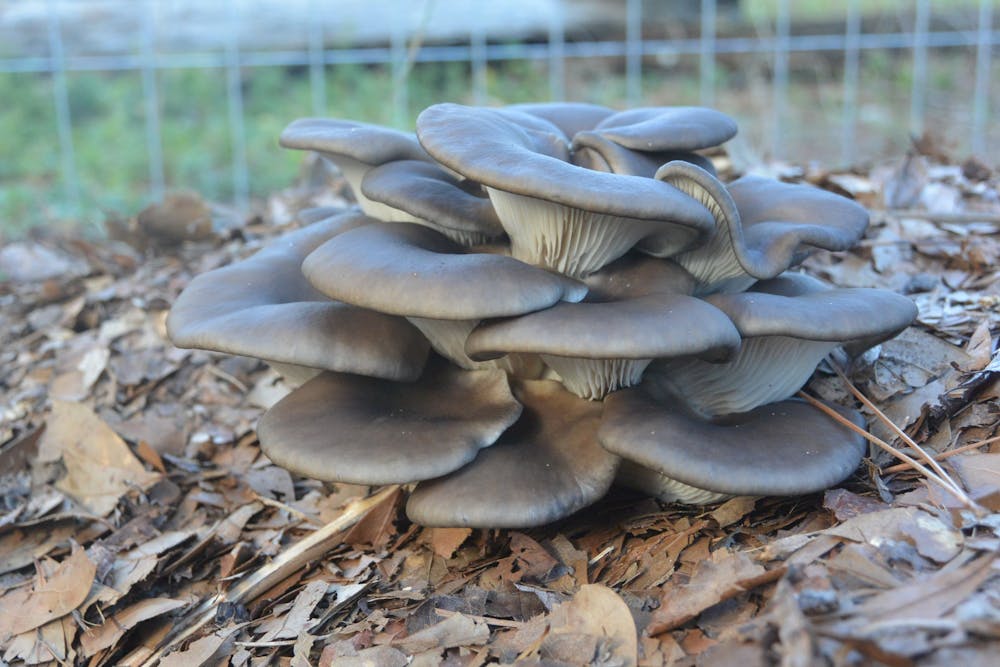With organic produce in high demand, those who possess green thumbs gravitate towards developing their techniques in the garden. Students make use of these such skill sets in Auburn’s very own Organic Garden Club.
The AOGC aims to use completely natural methods of gardening in order to grow produce that retains maximum healthiness and lacks any harmful chemicals typical of non-organically grown foods.
Phillip Reynolds, president of the club and graduate student in adult education, graduated from Auburn in the spring with a major in horticulture and minor in sustainability. As one of the founding members of the AOGC, Reynolds describes the club as a place for students to discover and eventually reestablish a more sustainable approach to gardening that has been somewhat lost in this modern age.
“I was part of the group that started the club, and we wanted to have a club on campus that would bring together people who wanted to connect with nature and produce some food at the same time,” Reynolds said.
Reynold’s interest in organic gardening dates back to when he was a young boy helping his grandfather tend to the family garden.
“My grandfather had a garden when I was little,” he said. “He mostly raised peas and tomatoes, and it was always great smelling all the fresh produce coming into the house.”
Later in life, Reynolds traveled to Berkeley, California, where he encountered many community gardens throughout the area.
“It was amazing to be able to walk down the road and get fresh food,” Reynolds said. “I wanted to bring that ability to others back here. We have a lot of agriculture in Alabama, but there are still plenty of food deserts around, too.”
Food deserts refer to areas that lack access to fresh produce at affordable prices.
Although his own personal life and studies have been centered around organic food production, Reynolds declares the club to be open to a diverse group of majors and welcomes all students interested in a hands-on education about natural growing methods for edible and medicinal plants to join.
“As a club, we will search out and bring together different natural growing methods to maximize the efficiency of farming techniques,” he said.
Despite the numerous positives that emerge from organic gardening, Reynolds said it is a common belief that the practice is too difficult or that the processes used are not attainable.
“Organic gardening tends to be misunderstood. There are thoughts that it does not work or that it isn’t a viable method for going about production,” Reynolds said.
These misunderstandings spring from the ambiguous label of what organic gardening truly is. This can be confusing or intimidating to those unfamiliar with the garden.
Even Reynolds, a well acclimated and informed gardener, struggles to give it a specific definition.
“There hasn’t been a universal meaning for it, especially in the grocery store, and I believe that that has caused a rift in people’s minds about organic practices,” he said. “We at the club are focused on soil health and supporting the biodiversity of pollinators and beneficial insects instead of only focusing on chemical applications.”
Reynolds said there are ways of pest control through organic gardening, however, but they require the teamwork of several people.
In order to accomplish their goals, the AOGC plants several gardens in the spring and fall. They also have a cover crop planting – crops planted to protect the soil during harsh weather, and not meant to be harvested – over the fall and winter.
“This semester we are starting up a partnership with the Fungi Farm to grow some mushrooms along with our produce,” Reynolds said. “We haven’t done much traveling yet. We visited the Davis Arboretum for a lesson on lumberjacking from Patrick Thompson, and we also visited the Fungi Farm to see what a mushroom spawn laboratory looks like. We have planned to visit some local farms.”
The club members share memorable experiences all while furthering their understandings of organic food development.
“Every time that we have a harvest in the garden is a great time,” Reynolds said. “Seeing the smiles on members’ faces when they see the food that they grew out of the ground is priceless. We have also had a number of pumpkin smashes from year to year to boost our compost pile and reduce the pumpkins going into the waste stream.”
These rewarding and fun moments are accompanied by their own set of challenges, however, the AOGC tackles these issues with creative methods that often incite some laughs, said Reynolds.
“We had deer and rabbit visitors for a while that we had to creatively deter away from our plots,” Reynolds said. “Turns out they are not a fan of the way we smell or hot sauce. So we spread some soap around the area and applied some capsaicin — an active component of chili peppers — to the plants. I like to imagine that [we] shocked some poor woodland critter away from our lettuce.”
Reynolds’ horticulture classes often dealt with theoretical studies of gardening, and the AOGC allowed him to apply his studies on a more tangible basis.
“The club has taught me many things in the realm of gardening,” he said. “It was great having a place to practice all that lessons from class and share it with others. There is nothing like just going out and getting my hands dirty. There are all kinds of lessons in the dirt.”
Reynolds hopes the club will continue to grow and cultivate a community that values organic productions.
“Our goals are to expand our products as much as we can,” he said. “We want to have so much food that we have to give [it] away. We also want to continue stirring a passion for growing plants inside of curious minds.”
Reynolds invites anyone affiliated with Auburn University interested in getting their hands dirty, improving their green thumbs, or just learning the basics of gardening to visit the Auburn Organic Garden Club’s plot at the Kreher Preserve and Nature Center where they meet every Monday at 5 p.m.
“The garden isn’t going anywhere and we love to have people stop by and see our progress,” Reynolds said. “It is never too late to start working with nature.”
Do you like this story? The Plainsman doesn't accept money from tuition or student fees, and we don't charge a subscription fee. But you can donate to support The Plainsman.

Nicole Lee, junior in English, is a campus writer for The Auburn Plainsman.





